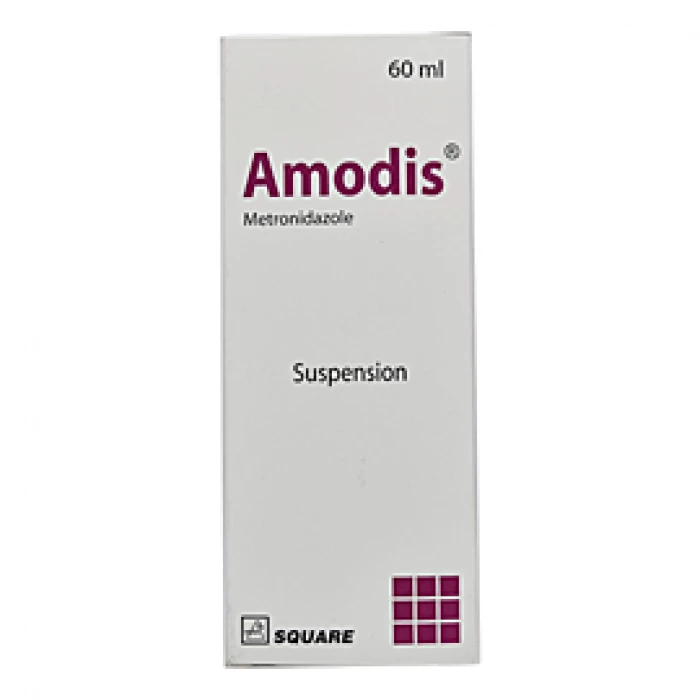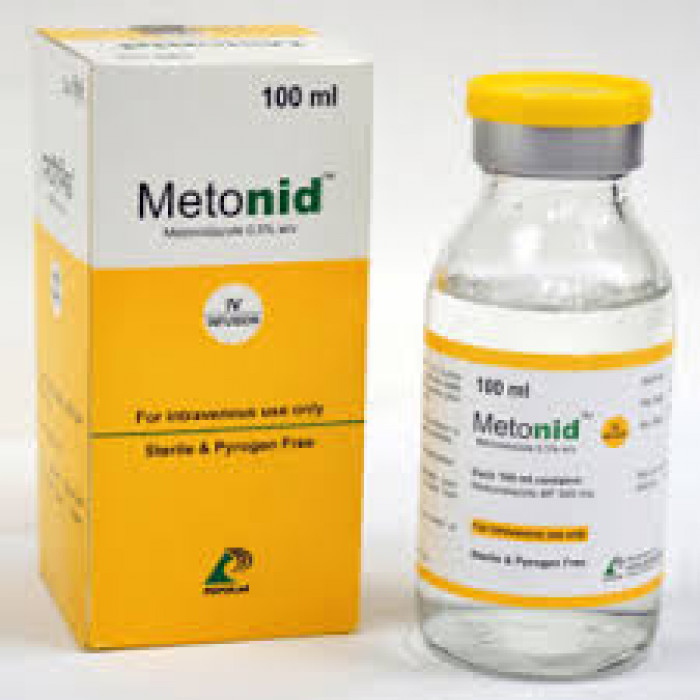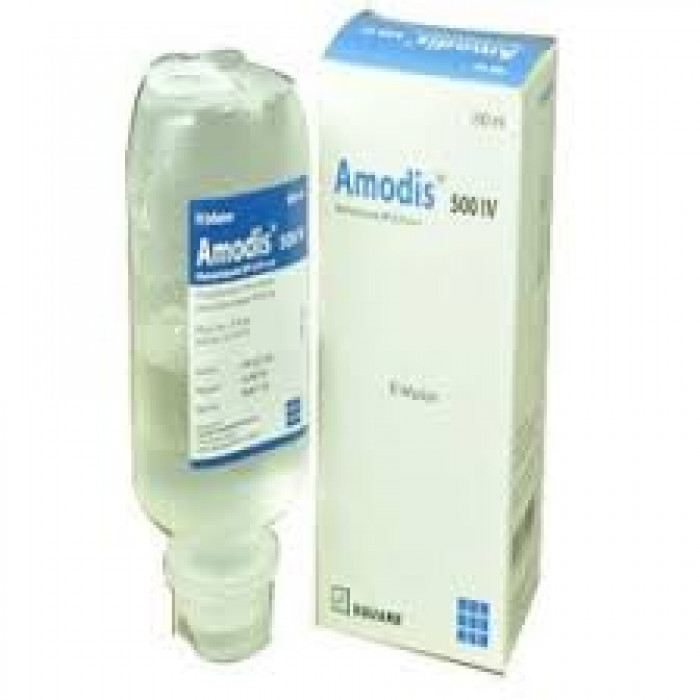
✔ 100% Authentic Product
👁️ Currently Viewing 6733
Amodis Suspension 60ml
- Amodis Suspension is an antibiotic that assists your body in fighting infections caused by bacteria and parasites.
- It is employed in the treatment of infections of the liver, stomach, intestines, vagina, brain, heart, lungs, bones, and skin. Amodis aids in the prevention of infection following surgery.
- It's also used to treat tooth infections, leg ulcers, and pressure sores.
Discount
Price: ৳ 33
MRP:
৳
35
5%
Off

100% Genuine Products, Guaranteed

Safe & Secure Payments, Always

Fast, Secure & Efficient Delivery

Proper Packaging
 Cash on Delivery - All over Bangladesh
Cash on Delivery - All over Bangladesh Regular Delivery - 12-24 Hours, Dhaka City* Charge Tk.39-59
Regular Delivery - 12-24 Hours, Dhaka City* Charge Tk.39-59 Regular Delivery - 24-48 Hours, Other Cities* Charge Tk.99-110
Regular Delivery - 24-48 Hours, Other Cities* Charge Tk.99-110
🌙 রমযান অফার 🌙
 ফ্রি ডেলিভারিঃ - ৭৯৯ টাকা+ অর্ডারে, ঢাকা
শহরে
ফ্রি ডেলিভারিঃ - ৭৯৯ টাকা+ অর্ডারে, ঢাকা
শহরে ফ্রি ডেলিভারিঃ - ২৭৯৯ টাকা+ অর্ডারে, ঢাকার
বাহিরে
ফ্রি ডেলিভারিঃ - ২৭৯৯ টাকা+ অর্ডারে, ঢাকার
বাহিরে
📲 মোবাইল অ্যাপ অর্ডারে সাশ্রয় বেশী
-
Google Play Store থেকে ডাউনলোড
-
Apple Store থেকে ডাউনলোড
100% Genuine Products, Guaranteed
Safe & Secure Payments, Always
Fast, Secure & Efficient Delivery
Proper Packaging
 Cash on Delivery - All over Bangladesh
Cash on Delivery - All over Bangladesh Regular Delivery - 12-24 Hours, Dhaka City* Charge Tk.39-59
Regular Delivery - 12-24 Hours, Dhaka City* Charge Tk.39-59 Regular Delivery - 24-48 Hours, Other Cities* Charge Tk.99-110
Regular Delivery - 24-48 Hours, Other Cities* Charge Tk.99-110 ফ্রি ডেলিভারিঃ - ৭৯৯ টাকা+ অর্ডারে, ঢাকা
শহরে
ফ্রি ডেলিভারিঃ - ৭৯৯ টাকা+ অর্ডারে, ঢাকা
শহরে ফ্রি ডেলিভারিঃ - ২৭৯৯ টাকা+ অর্ডারে, ঢাকার
বাহিরে
ফ্রি ডেলিভারিঃ - ২৭৯৯ টাকা+ অর্ডারে, ঢাকার
বাহিরে- Google Play Store থেকে ডাউনলোড
- Apple Store থেকে ডাউনলোড
🌙 রমযান অফার 🌙
📲 মোবাইল অ্যাপ অর্ডারে সাশ্রয় বেশী
✅ Description:
- Amodis Suspension belongs to a group of medicines known as anti-microbial agents used to treat bacterial infections of the blood, brain, lung, bone, pelvic area, stomach lining, intestines, gum, and teeth, following childbirth or wound infection following an operation. It is also used to treat infected leg ulcers, pressure sores, stomach ulcers caused by Helicobacter pylori, urinary or genital infections caused by the Trichomonas parasite, and amoebiasis (parasitic infection of the colon), and to prevent infections after surgery.
- Amodis Suspension contains metronidazole which works by preventing the production of proteins required by harmful microorganisms for their survival. Thereby Amodis Suspension treats bacterial and parasitic infections. Your doctor will decide the duration depending on the type of infection.
- Some common side effects of Amodis Suspension are nausea, vomiting, upset stomach, loss of appetite, dry mouth, and metallic taste. Most of these side effects do not require medical attention and resolve over time. However, if the side effects persist or worsen, consult a doctor.
- Amodis Suspension should not be used during pregnancy, especially during the first trimester and while breastfeeding.
- Do not drive or operate heavy machinery after taking Amodis Suspension as it may cause dizziness and drowsiness. Avoid consumption of alcohol while on treatment with Amodis Suspension and for 48 hours after completing the course as it may cause unpleasant side effects. Keep your doctor informed about your health condition and medications to rule out any side effects.
Safety Advices

Alcohol
UNSAFE
Avoid consumption of alcohol while taking Amodis Suspension as it may cause unpleasant side effects such as nausea and vomiting, stomach pain, hot flashes, irregular heartbeat, and headache.

Pregnancy
CONSULT YOUR DOCTOR
Amodis Suspension is not recommended for use in pregnant women unless considered necessary by the physician. Therefore, consult your doctor before taking it.

Breastfeeding
UNSAFE
Avoid breastfeeding while taking Amodis Suspension and for 12-24 hours after completing the course.

Driving
CAUTION
Amodis Suspension may cause dizziness and drowsiness; thus, avoid using machinery or driving unless you are alert.

Kidney
CAUTION
Amodis Suspension is to be taken with caution, especially if you have a history of kidney diseases/conditions. Your doctor may adjust your dose depending on your kidney conditions.

Liver
Amodis Suspension is to be taken with caution, especially if you have a history of liver diseases/conditions. Your doctor may adjust your dose depending upon your liver conditions.
✔️ Uses of Amodis Suspension
Treatment of-
- Bacterial Infections
- Parasitic Infections
✔️ How does Amodis Suspension work?
is an antiprotozoal agent with antibacterial properties. It works by killing the bacteria and parasites that cause infections in the body. This destroys the infection-causing germs within the body and prevents their further growth and multiplication which therefore reduces the severity of the infection.
✔️ Side Effects of Amodis Suspension
- Agitation
- Blurred vision
- Burning or tingling sensation of hands and feet
- Confusion
- Dizziness
- Headache
- Nasal congestion
- Skin rash
- Bleeding gums
- Constipation
- Dark urine
- Fast heartbeat
- Dizziness
- Stomach pain
- Diarrhea
- Change in taste/ Metallic taste
✔️ Quick Suggestions:
- It is important to avoid consuming alcohol while taking Amodis and for 2-3 days after completing the treatment. Alcohol can interact with the medication and lead to unpleasant symptoms such as nausea, vomiting, flushing, and headache.
- After completing the full course of Amodis Suspension, it is recommended to take probiotics to restore the healthy bacteria in the intestine that may have been affected by the medication. Probiotics, which can be found in certain fermented foods like yogurt, cheese, sauerkraut, and kimchi, help promote the growth of beneficial bacteria and reduce the risk of antibiotic-associated diarrhea.
- Including more fiber-enriched foods in your diet, such as whole grains like whole-grain bread and brown rice, can help stimulate the growth of gut bacteria and aid in their proper functioning.
- It is important to avoid consuming alcoholic beverages while taking Amodis Suspension, as alcohol can lead to dehydration and interfere with the effectiveness of the medication in fighting off infections.
- If you experience diarrhea while taking Amodis, it is crucial to drink adequate amounts of fluids to prevent dehydration.
- If you have liver disease, it is important to inform your doctor, as your dosage may need to be adjusted, especially in cases of severe liver disease. Close monitoring and appropriate adjustments can help ensure the safe and effective use of the medication.
✔️ Indication of Amodis Suspension
It is used in adults and in children (including full-term new-borns) to treat various bacterial and parasitic infections such as:
- Amoebiasis and Giardiasis (a parasitic infection causing severe diarrhea with stomach cramps)
- Infection of the genital or urinary tract (such as trichomonas vaginitis)
- Blood infections
- Brain infections (such as meningitis)
- Lung infections
- Bone and joint infections
- Stomach infections (Ex. H. pylori infection)
- Infection of the pelvic area
- Gum and teeth infections (Ex. gingivitis or other dental infections)
- Infected leg ulcers or pressure sores
It also helps in preventing post-surgical infections and infections following childbirth.
✔️ Pharmacology
Metronidazole is an antiprotozoal medication that is classified as an imidazole antibacterial drug. Its mechanism of action involves the reduction of its 5-nitro group by anaerobic bacteria during metabolism. The reduced form of metronidazole interacts with DNA, resulting in a bactericidal effect.
When metronidazole is taken by the patient, it undergoes a process in which it is metabolized by anaerobic bacteria present in the body. This metabolism leads to the reduction of the drug's 5-nitro group. The reduced form of metronidazole then interacts with DNA in the bacterial cells. This interaction disrupts the DNA helical structure, inhibits DNA synthesis, and ultimately leads to the death of the bacteria.
By targeting the DNA of bacteria, metronidazole is effective against a wide range of anaerobic bacteria and protozoa. It is commonly used to treat infections caused by these organisms, such as certain types of bacterial infections, as well as protozoal infections like trichomoniasis and amoebiasis.
It's important to note that metronidazole is specifically effective against anaerobic bacteria and protozoa, and may not be effective against other types of bacteria or viruses. Additionally, metronidazole should be used only as prescribed by a healthcare professional, and the full course of treatment should be completed to ensure the eradication of the infection and prevent the development of drug resistance.
✔️ Dosage & Administration of Amodis Suspension
The dosing recommendations for Amodis Suspension (Metronidazole) in different age groups and for various indications. It is important to note that this information is intended as a general guide and should not replace the instructions provided by your doctor or healthcare professional. Dosages may vary depending on the specific condition being treated, the patient's age and weight, and other individual factors.
Here is a summary of the dosing recommendations mentioned:
Oral Dose:
- Amoebiasis: The dose for children is 30-50 mg/kg/day given every 8 hours. The duration of treatment varies.
- Trichomoniasis: The recommended dose for adults is 2 grams as a single dose. For children, the dose varies based on age and weight.
- Giardiasis: The recommended dose for adults is 2 grams once daily for 3 days. For children, the dose varies based on age.
- Bacterial vaginosis: The recommended dose for adults is 2 grams as a single dose or 400 mg twice daily for 5-7 days.
- Anaerobic bacterial infections: The initial dose for adults is 800 mg followed by 400 mg every 8 hours. The duration of treatment depends on the severity of the infection.
Intravenous Dose:
- Anaerobic bacterial infections: The recommended dose for adults is 500 mg infused over a specific period of time. The duration of treatment and dosing frequency depends on the severity of the infection.
- Prophylaxis of postoperative anaerobic bacterial infections: The dose for adults varies based on the timing and route of administration.
The dosing recommendations for children are provided based on age and weight. It is essential to consult with a healthcare professional to determine the appropriate dosage for a child based on their specific condition and characteristics.
For individuals with hepatic impairment, the dosage may need to be adjusted, particularly in cases of severe impairment.
Always follow the instructions provided by your doctor or healthcare professional regarding the dosing and administration of Amodis Suspension. They will consider your specific condition and provide you with the most suitable regimen.
✔️ Interaction
Medications used to treat HIV (amprenavir): Amodis Suspension may interact with amprenavir, a medication used to treat HIV. The combination of these two drugs can increase the risk of side effects and may require dose adjustments or alternative treatment options.
Anti-coagulant medications (anisindione, dicumarol, warfarin): Amodis Suspension can interact with anti-coagulant medications, such as anisindione, dicumarol, and warfarin. This interaction can increase the risk of bleeding. Close monitoring of blood clotting parameters is necessary, and dose adjustments may be required.
Certain vaccinations (BCG, cholera vaccine live, typhoid vaccine live): Amodis Suspension may interfere with the effectiveness of certain vaccines, such as BCG, cholera vaccine live, and typhoid vaccine live. It is recommended to avoid live vaccines during treatment with Amodis Suspension l. Consult with your doctor or healthcare professional for guidance on vaccination schedules.
Anti-cancer medication (busulfan): Amodis Suspension can interact with busulfan, an anti-cancer medication. This interaction may increase the toxicity of busulfan. Close monitoring is necessary, and alternative treatment options may be considered.
Medicines containing ethanol: Amodis Suspension contains ethanol, and consuming additional ethanol from other sources, such as alcoholic beverages or certain medications, can increase the risk of side effects or toxicity. It is advisable to avoid the concurrent use of ethanol-containing substances.
Regarding drug-disease interactions, it is important to inform your doctor if you have Clostridium difficile-associated diarrhea, bone marrow depression/low blood count, CNS disorder, epilepsy, porphyria, peripheral neuropathy, heart, kidney, or liver problems. These conditions may require special consideration or dosage adjustments when using Amodis Suspension.
It is crucial to consult with your doctor or healthcare professional before starting or stopping any medication to ensure safe and effective use, and to discuss any potential interactions or concerns related to your specific medical condition.
✔️ Contraindications
Patients who have a history of allergy to metronidazole or other nitroimidazole derivatives should not use metronidazole.
✔️ Pregnancy & Lactation
The US FDA classifies pregnancy with metronidazole as B. However, there are no adequate and well-controlled studies on pregnant women. Because animal reproduction studies do not always predict human response, the drug should be used during pregnancy only when clearly necessary. Metronidazole has been shown to be excreted in human milk. Therefore, caution should be exercised when administering metronidazole to lactating women.
✔️ Precautions & Warnings
- If you have known allergies to any components of Amodis Suspension l, avoid taking it.
- Amodis Suspension should not be used during pregnancy, particularly in the first trimester. Inform your doctor if you are pregnant or planning to become pregnant.
- Breastfeeding should be avoided while taking Amodis Suspension and for 12-24 hours after completing the course.
- It is advisable not to drive or operate heavy machinery after taking Amodis Suspension , as it can cause dizziness and drowsiness.
- Inform your doctor if you have specific medical conditions, such as Clostridium difficile-associated diarrhea, bone marrow depression/low blood count, CNS disorder, epilepsy, porphyria, peripheral neuropathy, heart, kidney, or liver problems.
✔️ Storage Conditions
Store below 30°C. Keep protected from light. Keep medicines out of the reach of children. Do not use it later than the date of expiry.
⚠️Disclaimer:
At ePharma, we’re committed to providing accurate and accessible health information. However, all content is intended for informational purposes only and should not replace medical advice from a qualified physician. Please consult your healthcare provider for personalized guidance. We aim to support, not substitute, the doctor-patient relationship.


























